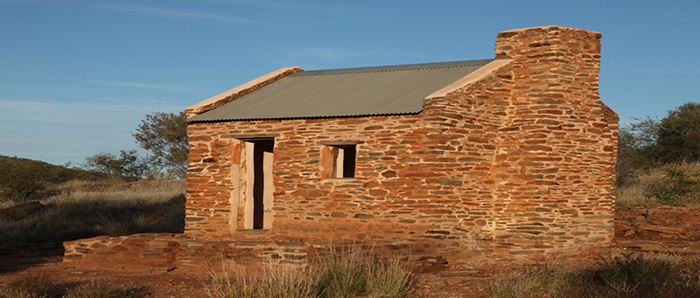Arltunga
Fossicking area 29516, previously known as FA2

Copyright: Michael J Barritt Assayers Residence, Government Works, Arltunga Historical Reserve, 100 kms E Alice Springs, Central Australia
History
The historic town of Arltunga was officially Central Australia's first town and once supported up to 3,000 people. Arltunga was born out of a gold rush in 1887 when alluvial gold was discovered in a dry creek bed.
Today visitors can pan for gold and explore the remains of old mines, miner's camps and stone buildings, some of which have been restored and preserved. The fossicking area is located outside of the reserve; however you can pan for gold in the visitor centre's courtyard display.
Discoveries
Gold
Alluvial gold may be found in the alluvium/colluvium areas shown on the map and in Mission Creek within the fossicking area boundary.
Access
Access is from the Ross Highway south of Alice Springs. Travel 1.5 km south from Heavitree Gap along the Stuart Highway, then turn left onto the Ross Highway.
Follow the Ross Highway for 72 km to the Arltunga turn-off, which is well signposted (the Ross Highway is sealed up to the Arltunga turn-off). Then drive 33 km north-west to the Arltunga pub. The fossicking area is found 1.3 km past the Arltunga Bush Hotel, where the track crosses Mission Creek.
Access to Arltunga is suitable for conventional vehicles with care.
Particular care must be taken to fossick only within the boundaries of the fossicking area.
The fossicking area is bounded by the Arltunga Historical Reserve and Aboriginal Land, on which fossicking is strictly prohibited.
Fossickers are advised to call into the Northern Territory Parks and Wildlife Commission Visitors' Centre where further information is available about the Arltunga area.Please be aware that water is very scarce in the Arltunga area, so fossickers must be responsible for carrying their own water requirements.
Fossickers must take their rubbish with them when they leave.
Fires are not to be lit in the Reserve.
No firearms or hunting are permitted in the Reserve.
Fossickers must observe any further conditions that may be signposted on the public road which passes through the fossicking area.Camping is not permitted in the fossicking area.
Travelling in the NT
Driving in the Northern Territory can pose unique challenges even to the experienced traveller, and road conditions can change rapidly.
Check road conditions, rest stops and National Park closures prior to setting out.

